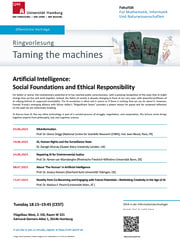Cancelled: Lecture on June 10, 2025
Lecture cancelled: Human Rights and the Surveillance State
Dr. Daragh Murray (Queen Mary University London, UK)
About the lecture [poster]
Facial recognition technology has rapidly transitioned from the realm of science fiction to everyday life, monitoring our activities in public spaces, securing our devices, and being heralded by law enforcement as a crucial tool against crime. While various entities employ this technology, State, and in particular law enforcement, use of facial recognition is widely regarded as ‘more permissible’. This use case straightforwardly illustrates the difficulty in addressing the harms caused by pervasive surveillance through a traditional human rights law lens.
This talk discusses facial recognition technology as illustrative of, and central to, the emerging pervasive surveillance ecosystem.
Despite growing concerns, criticism of the advent of pervasive surveillance has struggled to gain significant traction in legal and policy discussions. There appears to be a prevailing sense of inevitability surrounding its adoption, with the focus primarily on establishing limitations and safeguards rather than fundamentally questioning its societal impact or the appropriateness of certain applications.
It is hard to avoid the conclusion that in failing to pay sufficient attention to the emergence of a new pervasive surveillance ecosystem we have made – or more optimistically are making – a huge collective mistake. This talk will address the impact of pervasive surveillance on individuals’ ability to freely develop their identity, and what this means for the evolution of democratic society, highlighting the challenges posed to the enduring relevance of the human rights framework.
About the speaker
Daragh Murray is a Senior Lecturer at Queen Mary University London School of Law, and a Fellow of the Institute of Humanities and Social Sciences. He specialises in international human rights law and the law of armed conflict, with a particular interest in the use of artificial intelligence and other advanced technologies. He has been awarded a UKRI Future Leaders Fellowship to examine the impact of artificial intelligence on individual identity development and the functioning of democratic societies. This 4 year project runs until January 2026 with a current focus on law enforcement, intelligence agency, and military AI applications, and on understanding the ‘chilling effects’ of surveillance. Previous research examined the relationship between human rights law and the law of armed conflict and the regulation and engagement of non-State armed groups.

photo credit: private
Tuesday, 10. June 2025, 18:15-19:45 (CEST)
Address for joining us on-site:
Flügelbau West, 2. OG, Raum W221
Edmund-Siemers-Allee 1
20146 Hamburg

